Who Helps the Heroes?
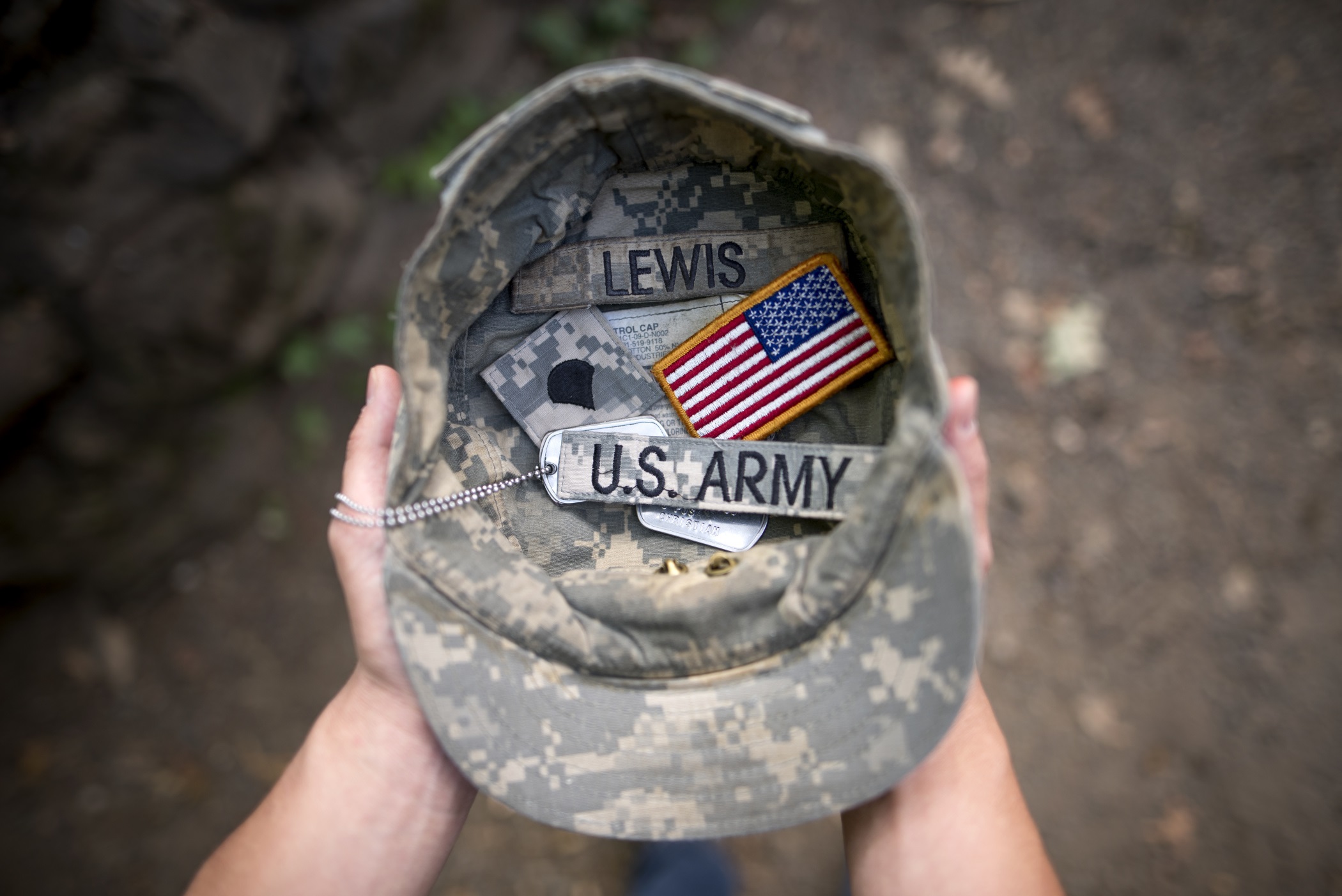
Student Veteran Bryan Lewis’ uniform items and patches are seen in his hat on Thursday, September 27, 2018 in Chico, Calif. (Jessica Bartlett/University Photographer/CSU Chico)
Chico State Veterans Seek Support Where
They Always Have: From Each Other
Words await military members when they return to civilian life.
“Welcome home.”
“Thank you for your service.”
“We love the troops.”
They never hurt. But they seldom help.
Those who enter the United States armed forces face grueling training, long-term family separation, and myriad other physical and psychological hardships throughout their service. Some bring home wounds that will stick with them for the rest of their lives—crushed ribs, PTSD, substance dependencies, hearing or vision loss, anxiety, worn knees and hips, to name a few.
As veterans adjust to civilian life, they can often feel like outsiders—being on a college campus only exacerbates the feeling. On top of that, the rigors of everyday life—jobs, academics, families—can also cause heavier burdens: unexpressed anxiety, a yearning for responsibilities long relieved, memories of relationships severed by discharge or combat. The military experience is one where few others will ever truly be able to relate.
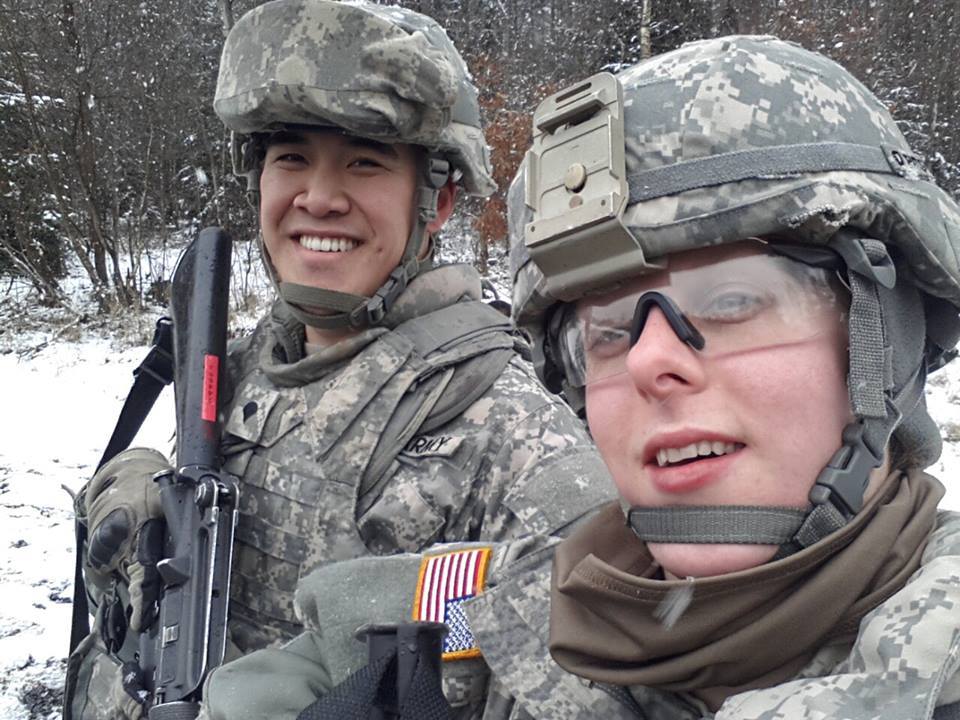
The uncomfortable truth is that military culture isn’t an easy one for civilians to embrace, and vice versa.
“It kills your empathy,” said Bryan Lewis, a 26-year-old business management major and four-year Army veteran. “People want to complain about their stupid first-world problems, but I can’t really care when a kid out there is walking two miles to get fresh water, trying not to step on a land mine.
“But you can’t tell anyone that. You have to pretend to care.”
Ultimately, it takes veterans to support veterans.
Chico State’s Student Veteran Organization (SVO) is one of 20 founding chapters of the national Student Veterans of America nonprofit, and our campus regularly receives recognition as a military-friendly campus, including being named to Military Advanced Education and Transition’s 2018 Top Colleges and Universities.
That is thanks to the campus Office of Veteran Affairs, which helps veterans, reservists, active-duty service members, and their dependents navigate benefits including everything from the GI Bill to US Veterans Affairs assistance. Its staff, including a focused all-veteran support team, serve students by churning through paperwork, directing them to online help sites, and providing a secluded area for studying or taking a break.
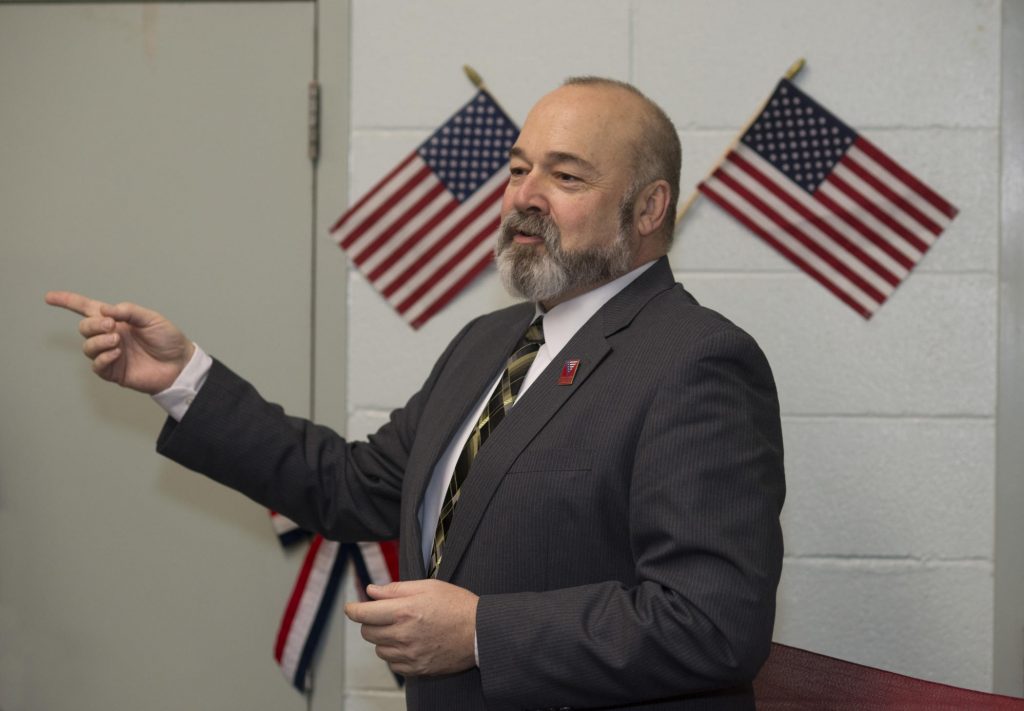
(Haley Traynor/Student Photographer)
At the head of the operation is Director Larry Langwell, whose own background—physical scars and transitional experience included—equips him to support military students in a representative way few others at the University can. Langwell has had numerous operations during and since his discharge from the Air Force, the result of a one-ton bomb falling onto him from a trailer as he worked on a runway while stationed in England.
Gesturing to an office photo of an enormous warhead, Langwell recounts the carnage: The bomb crushed his pelvis, caused severe intestinal damage, broke part of his skull, ruined his knee, and forced surgical reconstruction of his back and neck.
“I enjoyed the work. I was thinking about making it a career, and I was on the fast track. And then, the military says, ‘Get your ass out of here,’” he said. “They don’t want to retrain you. I had to recalibrate.
“Going through that transition is a part of the veteran experience,” Langwell added. “A lot of the camaraderie with veterans comes from suffering through things together. That’s our identity.”
It’s an understanding among a collective that is impossible for outsiders to replicate, no matter how good their intentions.
“Veterans have a unique culture of honor, valor, integrity, duty, and family,” Langwell said. “Most of them don’t want to leave that life behind, and that’s what we provide here. The University recognizes us as a culture, and we want to promote it for each other on campus.”
“People like veterans, but not when they act like veterans.”
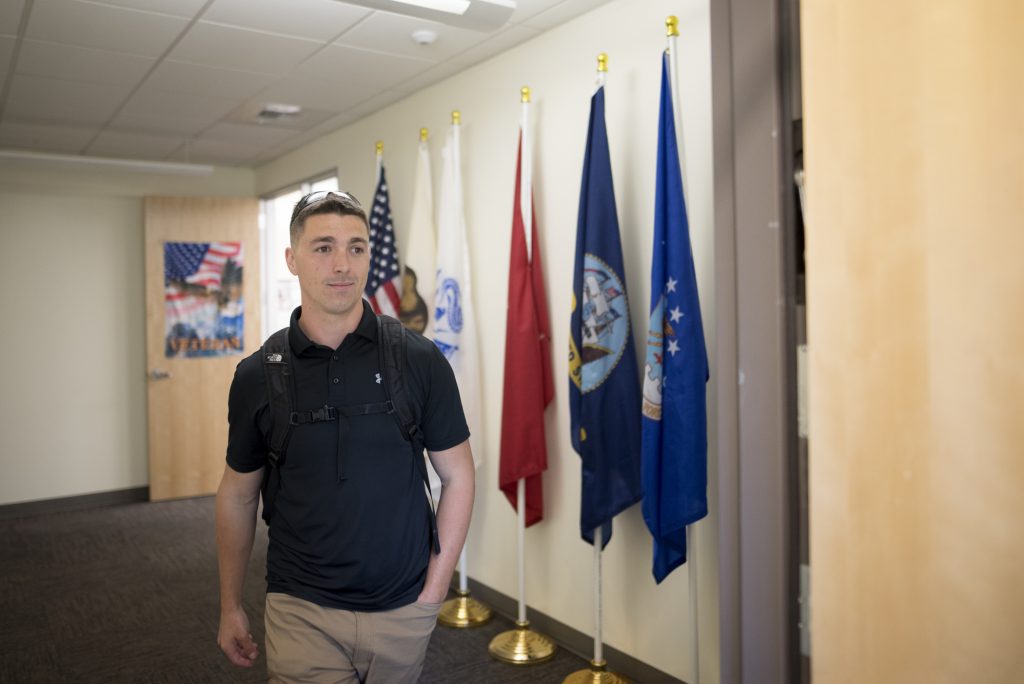
Muting the military persona is a frequent occurrence for many veterans, especially
students. So it goes for 29-year-old senior Jason Blum, a civil engineering major who served in the Marines as a heavy equipment operator from 2008–12 and completed two deployments in Afghanistan. Thick-chested but lean, with a close-cropped haircut and dark eyes, Blum shared some casually coarse insight seated on a campus bench, in a voice at once confident, honest, and markedly louder than the surrounding conversations.
“You can’t act like a veteran in a civilian world—it’s not accepted. You have to flip a switch,” Blum said. “I’d take a bullet for someone, but I can’t talk shit to their face like I would with another Marine, because I’d hurt their feelings. People like veterans, but not when they act like veterans.”
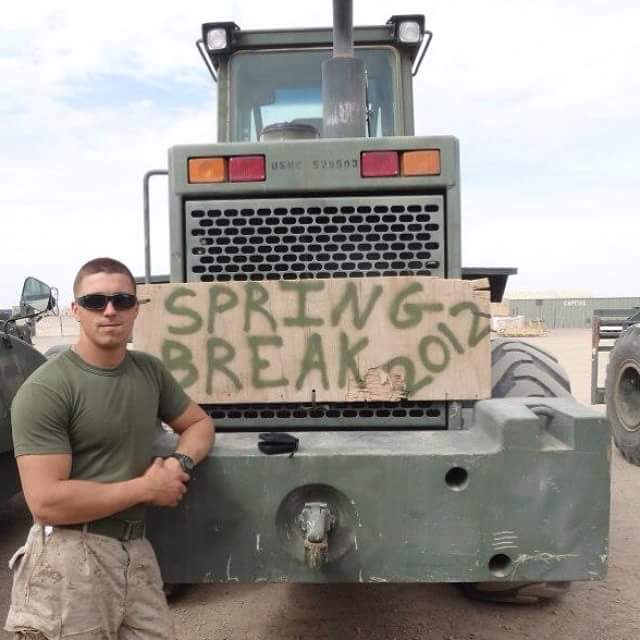
A prospective engineer, Blum does feel a kinship to other students living through struggle. Classmates paying their own way, in particular, impress the Marine from rural Eureka, who would not have been able to afford college himself if not for his GI Bill.
“Some people are getting their ass kicked, and my hat’s off to them. I respect that. I respect being in a shitty situation and having to work through it,” he said.
But for the most part, Blum said, there is a disconnect for veteran students in a setting where just one of every 64 students has served. (Nationally, veterans make up about 1 out of 25 undergrads.) Social dissonance is a common anxiety trigger, and it’s one of many factors contributing to the struggles of a population plagued by a suicide rate that triples the American average. Surrounding student veterans with those who just “get it” is a vital function of campus veteran services.
Lewis, an SVO member and Office of Veterans Affairs employee from Los Gatos, knows many of the stereotypes the armed forces endure aren’t without some truth: “All the cussing, drinking, fighting—that’s very real. Most of us are loud. A lot of us communicate in aggressive ways that regular people don’t want to associate with.”
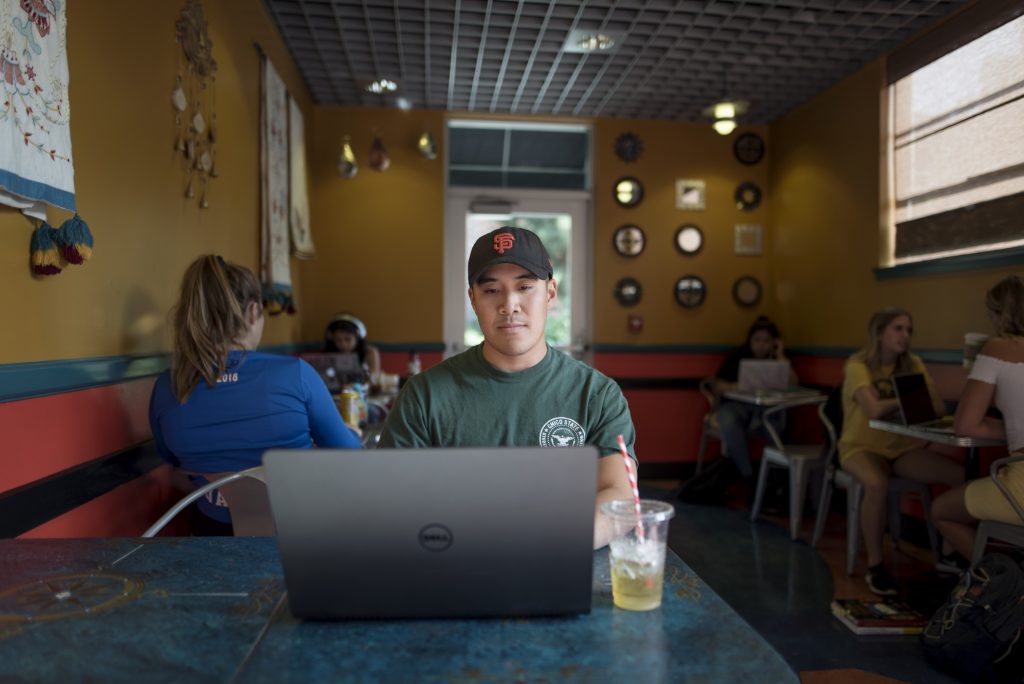
His experience in the Army, a four-year stint as a communications operative in which he worked with wiring, satellite, and radio technology, is one he looks back on with fondness and disdain. He liked some of it—“blowing stuff up,” traveling all over Europe while he was stationed in Germany before he spent a year on the Turkish-Syrian border—but he doesn’t miss Christmas leave being canceled, or the daily 5 a.m. 10-mile runs. His body feels broken from the intense physical demands of his military service.
“Deployment is rough. You don’t know when you’re going to come home. People are getting gassed, getting blown up, going three months without showers,” Lewis said. “But when you come back, you have this new perspective. It doesn’t translate to normal life.”
Lewis doesn’t resent the traditional student experience. But he points to civilian ignorance and attitudes toward the armed forces as a major reason veterans feel uneasy at home. After 12 months of shooting down chemical warheads and protecting civilians from hostile fire in the Middle East, Lewis came home on leave. His friend’s new girlfriend casually called him a “baby killer” when he told her he was in the Army.
“The people out there in the world, they appreciate us,” he said. “Around here, we’re treated like garbage.”
“I was enjoying the school life. Service life said, ‘You’re not doing that anymore.’”
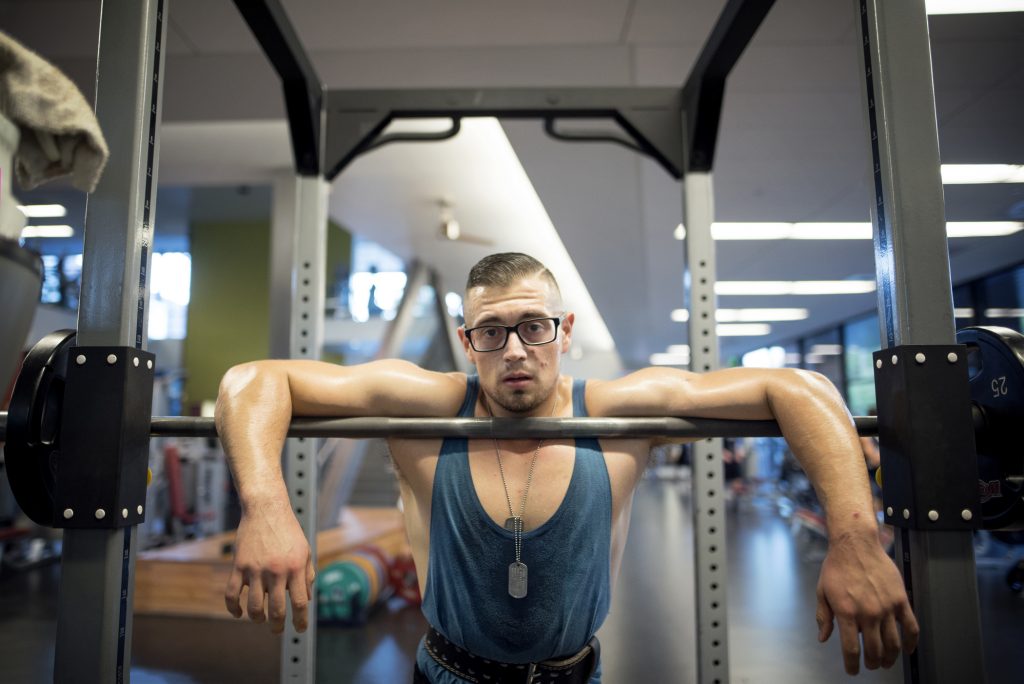
For many, the transition is never truly complete, regardless of how far removed they are from their service. Student veterans in the reserves, like criminal justice major Jorge Romero, commonly feel an inability to settle, knowing they might need to answer the call of duty at any given moment.
Romero enlisted in the Air Force Reserves at 19 out of Pierce High in Arbuckle, a 3,000-person ag town in the northern Sacramento Valley. Without any idea of what to do after high school, Romero, whose parents were migrant farmers, didn’t see himself destined to stick around and do manual labor his whole life. Excited at the prospect of working with airplanes and serving his country when he flipped through an Air Force pamphlet, he joined the Reserves and drew an assignment to Security Forces.
Romero did his basic training and technical school in San Antonio and served a one-year tour in Kuwait from 2016–17. While the bulk of his duties included search missions for people and vehicles and asset protection patrols, Romero was fondest of fly-aways—personnel protection and transport for veterans whose tours had ended.
“The best feeling is to see their faces when the plane’s in the air and they know they’re going home,” Romero said. “You know they’ve gone through so much of the same stuff you have—basic training, the struggle in general. Keeping them safe during that last home stretch, being the face they see when they have that realization they’re going to see their families again, that’s huge.” It is what he misses the most now that he is in the inactive Reserves.
At the same time, he knows he could be recalled to duty any minute. Such was the case when he returned from basic training and technical school to start his collegiate career. After two years at Woodland Community College, Romero had earned three associate’s degrees and was set to transfer to Chico State when his unit got the call for deployment. Not wanting to lose momentum in his education, he applied for an exemption, to no avail.
“I was enjoying the school life,” Romero said. “Service life said, ‘You’re not doing that anymore.’”
Almost two years later, Romero, now a senior, juggles 15 units, a job in the Office of Veterans Affairs, and the responsibility of helping direct the student veteran community to resources on and off campus. He is a self-described “gym rat,” spending much of his free time at the Wildcat Recreation Center, and a devotee to structure, with his daily schedule and even meals planned ahead of time. He has adapted to the unpredictable nature of being a reservist, and even grown to like it, he said. But he also encounters many veterans who haven’t reached that level of comfort yet, and he knows that feeling, too. In his role at the Office of Veterans Affairs, he’s trying to help others reconcile the gap between lives past and present, even amid his own occasional difficulties in turning off his military persona.
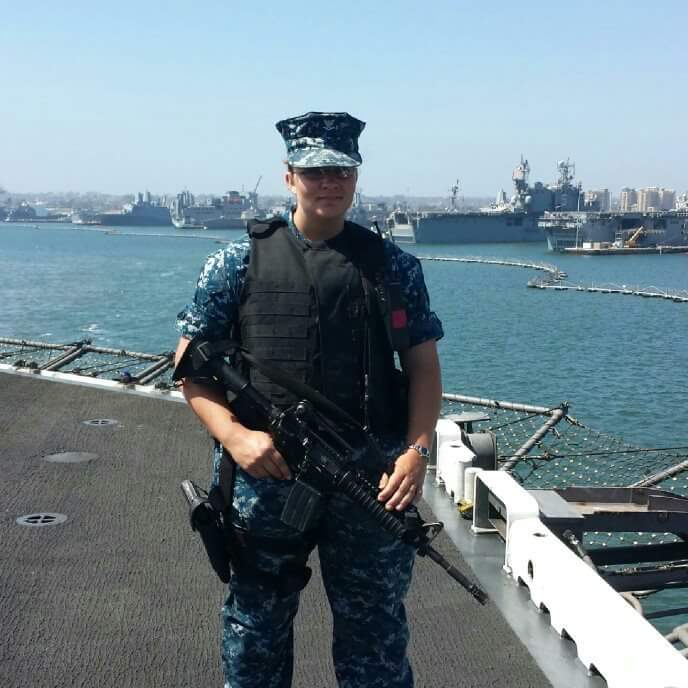
“I do have an opportunity to help people grow, like the Air Force helped me, but without the negative reinforcement,” he explained. “One of the biggest adjustments I’ve learned is that everyone has the right to own up to their own successes and failures.”
It’s not uncommon for student veterans to struggle with reintegrating to civilian life without demeaning their peers. In the military, virtue is found in punctuality, respect for authority, a general sense of fastidiousness. Among anyone who may not subscribe to those same values, let alone those with markedly less life experience, veterans can feel isolated, if not resentful.
“It does drive me nuts,” admitted Kiena Sanders, a 26-year-old animal science major and four-year Navy veteran. “I developed this mindset of commitment, doing my duty so someone else doesn’t have to do it, and that’s not the mindset of most of my generation in the workforce. The world around me says it’s fine, that you shouldn’t work yourself too hard, you should take breaks. I can’t think like that anymore.”
“Our brains have been rewired to navigate our problems in a way that can help our brothers and sisters in arms through theirs.”
With a full class schedule and aspirations of working with livestock in the veterinary field, Sanders complements her animal science studies by double minoring in chemistry and biology. She has her sights set next on veterinary school or a master’s degree to study zoonotic viruses. Sanders was a year into her community college career when she decided to join the Navy at 18. Doing as her grandfather and great-grandfather had done came to her friends’ surprise—and her mother’s anguish.
Working aboard the USS Makin Island in its San Diego home port as an aviation electronics technician second-class petty officer, Sanders spent seven months at sea during her enlistment, deploying to Hong Kong and Singapore, among other areas in Asia and the Middle East. Homesickness, frustration with communication along the chain of command, stress—many factors illustrated to her that military life is not for everyone. But the shared experience of service was a bond she found to be unbreakable, unlike so many friendships that faded when she was miles offshore with no internet or cell service, only reachable by hand-written letter.
“You can have a bad day, bad week, even a bad month. It’s mentally very challenging,” she said. “But you deal with it. … You have moments when you’re in it, that you realize that it’s awful, and at the same time you wouldn’t want to be anywhere else. And that’s mostly because you’ve got others going through it with you.”
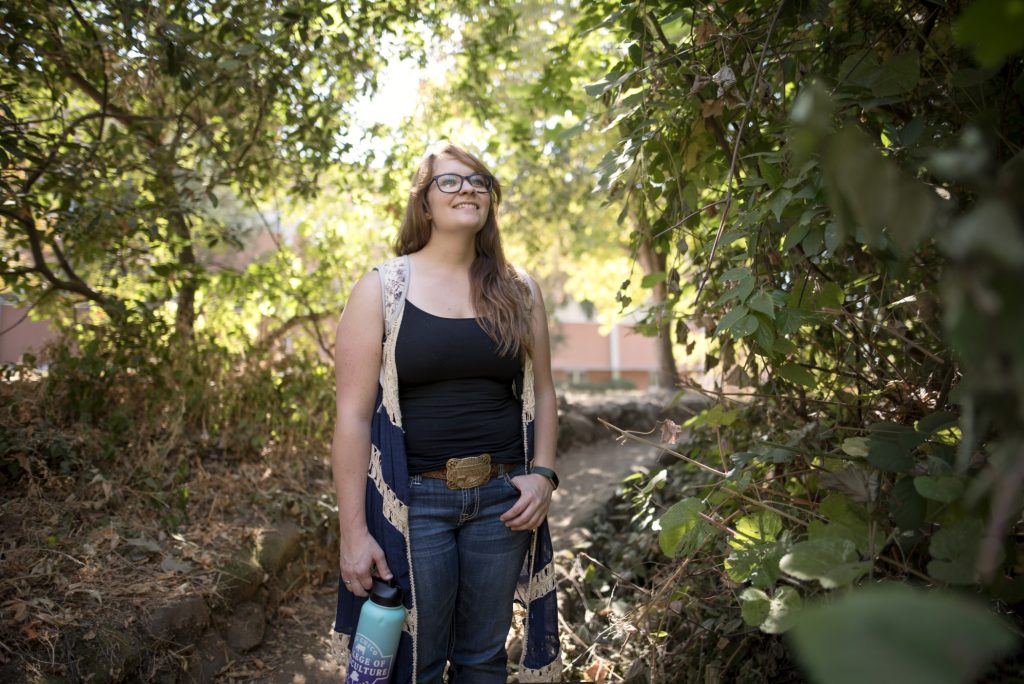
Now, Sanders, Lewis, Blum, Romero, and almost 275 other veteran students are going through the Chico State experience together, regardless of how much time they may spend at the Student Veterans Center or how willing they are to discuss their service. Sanders, who visits almost daily, said she appreciates a campus community that embraces her identity. Students, staff, and faculty are largely grateful and sensitive to veterans’ different perspectives, she said.
But support from those who can relate—to have the effort come from those who have experienced military life themselves—is irreplaceable.
“Our brains have been rewired to navigate problems in a way that we can help our brothers and sisters in arms through theirs,” she said. “You have to be able to trust the person next to you and know they trust you, too.”
Show your support: The Office of Veterans Affairs brings student veterans together and actively engages the campus, the media, and the broader community to advocate and raise awareness for veteran issues. Designate the Student Veterans Center to contribute.
2018 Veterans Day 5K Hoorah Run/Walk: The Veterans Day 5k Hoorah Run/Walk is hosted by Chico State Facilities Management and Services and raises money for student-veteran scholarships.


